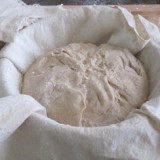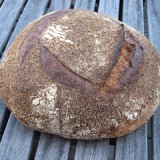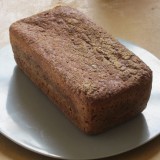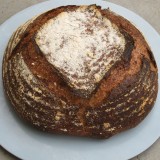
I’ve been teaching bread baking for a few years now through both the Institute of Domestic Technology and the Los Angeles Bread Bakers. When students ask what book they should get I have to hold up half a dozen. Not any more. Now I can send students to just one book: Josey Baker Bread.
The appropriately named Josey Baker (who used to work with another baker named Dave Miller–who mills his own flour, naturally) has written a perfect bread baking course in book form. Everything I’ve figured out about teaching how to bake is in here–start with a simple white bread, graduate to sourdough and then start baking with whole grain. Having trouble shaping a loaf? Bake in a loaf pan instead! Stretch and fold instead of kneading. Simulate a commercial bread oven by using a cast iron pot. And use a damn scale! There’s even the browned butter chocolate chip cookie trick I learned from a friend who owns a restaurant. Has Josey Baker wiretapped my phone?
The book is written in an amusing and breezy bro-speak. Here he is truth telling in the introduction to his scone recipe,
Most scones suck. Why do they suck? Because they’re dry as hell. Don’t act like you do’t know what I’m talking about! When was the last time you had a scone and didn’t say, “I don’t know, this is just a little dry for me.” Or maybe you haven’t even had a scone in a long time, because the last one you ate was so crappy. . . Are they healthy? No, they are not. But what the hell, exercise feels good, so eat as many as you want and then go ride your bike, baker.

My successful attempt at the Dark Mountain Rye recipe.
Speaking of healthy, I’ve been concentrating on the recipes in the sourdough-based whole grain section of the book. Like Baker, I believe that a lot of people self-diagnosing themselves as gluten intolerant might just be allergic to mass produced supermarket bread. Baker’s Dark Mountain Rye is an example of how whole grain bread should be made and it’s and easy to bake.
In addition to the conventional breads Baker covers, there’s an interesting method of baking pizza in a home oven, a gluten free loaf that I’m going to try and some simple pastries. I also like the flexibility Baker builds into the recipes. Many can either be baked in a loaf pan or shaped into a boule. And there’s always the option to retard the dough in the refrigerator to give more depth of flavor as well as flexibility in when to fire up the oven.
Josey Baker Bread will appeal to both beginners and experienced bakers. Finally the collective wisdom from the recent bread revolution is in one book. If you want healthy, good tasting bread in your household Josey Baker Bread is a great place to start.




Pingback: Josey Baker Bread: One Bread Book to Rule Them All | NewsSum
Just curious, is there no-knead advice too? I’m getting more lazy, apparently. 🙂
also – a comment was left in the bee event announcement re: the book review idea.
Wendy
Josey Baker is basically no-knead. He’s all about stretch and fold (which he calls kneading). Basically, every hour or so during the bulk fermentation you stretch out and fold over the dough–it’s far less labor intensive than traditional kneading.
And we saw the bee comment–thanks–we’ll look into it!
So just out of curiosity what were the half dozen that you used to recommend?
Thanks for the review. Now that you have read the Josey Baker Bread book which of the half dozen books that you used to recommend would you still find useful? I am curious what books were helpful to you in your baking education.
For the most part I have used Peter Rienharts books and I’ve noticed that he has updated many of his recipes to use the stretch and fold techniques. His books were the first ones where I learned of the delayed fermentation.
There are many paths up the holy mountain, as they say. I have great respect for Rienhart–I have no doubt that his recipes work–but I found them too complicated for my lazy brain. The books I found most useful were Tartine Bread (the first one, not the new one), How to Make Bread by Emmanuel Hadjiandreou, Flour, Water Salt Yeast by Ken Forkish, My Bread by Jim Lahey and Bread by Jeffery Hamelman. I also took classes recently with two whole grain bakers–Dave Miller and Craig Ponsford. Josey Baker has synthesized all of these related sources into one good book.
On a related note, have you done much baking in the clay oven in your back yard or do you mostly use the indoor oven?
I recently had some pizza at DeSano that just opened up in East Hollywood and was loving the 4 large wood burning ovens that they installed. It reminded much how I would like to build a clay oven one day but also I wonder whether I would use it often enough.
What has been your experience? Do you get it real hot for pizzas and then do loaves at a lower temp? Has it been a useful addition to your baking arsenal?
Will it tell me how to get lofty, hole-y 100% Whole Wheat sourdough?
Lofty yes. Holes are small, but uniform. I’ve had much success with this book. Interestingly, the hydration levels are lower than Dave Miller’s. Josey Baker goes for around 80%. I’ve had less problems with over-proofing.
I have all the symptoms of a problem with wheat/gluten. However, the tests all came back negative. The allergist told me that just because the tests came back negative, does not mean I don’t have a problem. A piece of white Wonder Bread gives me no problems. Whole grain does.
I cannot afford a book, so I just broke out my bread machine!
Are there any books with good recipes for spend grain? (That is, the grain that was used for for brewing beer)
I’m not aware of any books but I’ve seen some stuff online. The most success I had with spent grain was when I did a stout using a partial mash. The very dark specialty grain, when added to my usual Tartine bread recipe, made a really great dark colored bread. My attempts at using the spent grains from all-grain recipes were less exciting (the base grains are kind of bland). But perhaps those grains could be roasted in the oven or left to ferment as a porridge? More experimentation is needed!
Having ruined the last three beers I tried to make due to a sanitation problem, I took a break from brewing. I’m thinking of getting back to brewing all-grain soon and I’ll try using the spent grains for some bread. Then I’ll blog about it.
Pingback: #sharetheloaves « joseybakerbread
Thanks to your recommendation, I’ve been baking amazing sourdough bread from the Josey Baker book for about six months now. I’ve been baking for several years but before this book I could never manage a proper sourdough loaf. I love this bread more than any I’ve ever baked – hell, more than any I’ve ever eaten. But I recently tried the Mountain Rye and it was a complete failure. I did note that the recipe doesn’t call for the stretch and fold that the others do, is that a mistake? I also followed his recipe timewise and I think I should have let it take longer. Any advice? Nothing to take a baker down a notch like a brick …
Hi Lanen–Glad you’ve got some good sourdough going and sorry to hear the rye did not work out. How would you describe the rye loaf you made? What about it was wrong?
I’m still interested in hearing your process if you’re interested in sharing! 🙂
It didn’t rise at all. No change during proofing and zero oven spring. It also seemed underbaked. I was following along the recipe thinking … ok, only proof for an hour and a half, huh? “The real magic will happen in the oven.” But the magic clearly did not happen.